Cut down on your use of single-use plastics by swapping everyday products for reusable ones.
As part of Plastic Free July, we’ve taken a look at how we can reduce the amount of plastic we use for everyday items. As it turns out, 42% of people say that using products that use sustainable materials are important when it comes to their day-to-day purchases.
It may sound like a costly task but there are some really affordable and easy swaps that you can make to reduce the amount of plastic you buy and subsequently recycle or throw away. Just take a look at our list below!
Sustainable kitchen swaps:
Washing powder
Washing powder can be replaced with soap nuts. Nope, we’d never heard of them either. Essentially they are nuts that make a natural detergent and can be reused before being composted. They also don’t come in a plastic bottle and are better for the environment than washing powder. You can buy them on Amazon or make your own soap nuts if you’re feeling really thrifty.
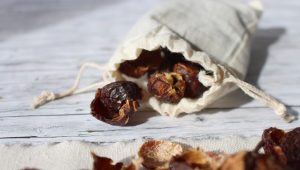
Soap nuts.
Teabags
Did you know that most tea bags contain plastic? There are teabags that don’t contain plastic that can be composted or biodegraded. However, they can be pricey and if you drink as much tea as we do at the YES headquarters you may end up spending a small fortune. One cheaper alternative would be to switch to loose tea. This is also a great excuse to buy in a new teapot and drink even more tea.
Cling film
You can use beeswax wraps instead of cling film. These are plastic free and reusable – but possibly best of all they come in pretty patterns!
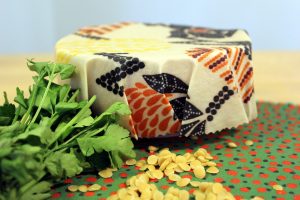
Beeswax wrap.
Washing up sponges
Plastic sponges for washing up release microplastics into the environment and are typically only used for a week before going in the bin. One alternative you could try would be a coconut scouring pad which lasts longer, is naturally antibacterial and can be composted once you’re done with it.
Or how about bamboo fibre sponge that can be washed and used again? Or there are sponges made entirely from loofah plants. There are loads of alternatives out there which will have you saving money over the year as well as being more environmentally friendly.
Water bottles
These should be a given by now, but if you haven’t yet invested in a reusable coffee cup or water bottle, now’s the time! You can pick them up for a couple of quid from your local supermarket. Your local coffee shop will serve your drink in your reusable cup, and there are increasingly free water stations so you can fill up your water bottle while you’re out and about. Find out more and download the app to find your nearest refill station.
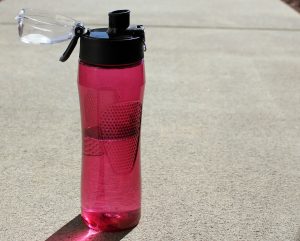
A reusable water bottle.
Baking paper
Instead of using one-use baking paper there are lots of varieties of reusable or biodegradable options. For example, Silicone mats or compostable parchment baking paper.
Kitchen towel
Yep. You can even buy reusable kitchen towel that can be washed and used again! We know this isn’t plastic but if you think about how much kitchen towel you buy (and ultimately throw away), reusable options such as napkins are much more environmentally friendly. We recommend looking on Amazon and checking the reviews to find the best kind for you.
Sustainable bathroom swaps:
Toothbrushes
If you use a manual toothbrush you may want to switch to one that is biodegradable as shockingly 80% of our plastic ones end up in the sea! Bamboo toothbrushes are a good swap for plastic ones. They can be composted after use, except for their bristles which are nylon. The Independent has rounded up their favourite bamboo toothbrushes here.
Use an electric toothbrush? There are toothbrush heads that some companies will accept back from you and recycle – like these recyclable toothbrush heads which are compatible with Oral-B electric toothbrushes. Simply post them back to their return address and the company will recycle them.
Cotton pads
If you wear make up, we recommend switching from make-up remover wipes or using cotton pads to a muslin cloth at the end of the day. You can also buy reusable bamboo make-up remover pads like these, which are good for removing nail varnish as well as make up.
Razors
Do you use disposable razors for shaving? Switching to a safety razor can save you money as well being more environmentally friendly. They look a bit scary but there are lots of YouTube videos and articles that insist they are called safety razors for a reason.
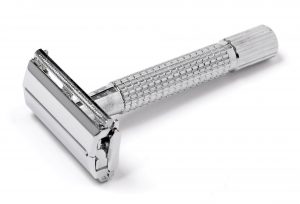
Safety razor.
Shampoo and conditioner
Bars of shampoo and conditioner are a great alternative to their bottled counterparts. They can be pricey (although cheaper ones are out there) but they do tend to last much longer bottled shampoo.
Liquid soap
Switching from liquid soap to bars is a simple yet effective swap. This is a sure way to help eliminate plastic from your bathroom. If you really can’t switch back to soap bars, try buying refills of liquid soap. While these still use plastic packaging, by buying these larger quantities you are buying less plastic than before. You can buy liquid soap refills like these from Tesco, as well as many other supermarkets.
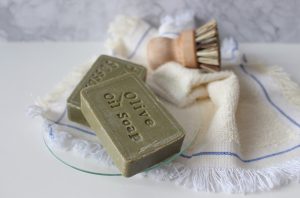
Soap bars.
Floss
Replace your floss with silk tooth floss. This stuff is a little bit more expensive but it’s both biodegradable and compostable. We like this silk floss example for its pretty (and refillable) packaging but there are lots of options out there for varying prices, so take a look online.
Sanitary products
Did you know that the average sanitary pad contains the equivalent of four plastic bags, takes 500 years to decompose and are the fifth most common plastic in ocean? (Note: do not flush these things down the loo!) The good news is that there are alternatives such as reusable sanitary pads and menstrual cups to try.
Nappies
There are alternatives to disposable nappies such as cloth nappies.
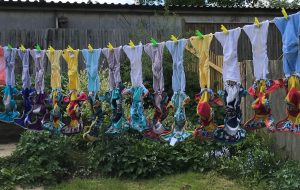
Reusable nappies.
This is definitely not an exhaustive list but hopefully it gives you some ideas for simple everyday swaps that you can make to help the environment. Of course, anything that can’t be swapped to a reusable or sustainable product should be recycled, where possible.
You can check with your local district or borough council for what you can recycle.
You can also check out the TerraCycle website which shows drop off points that collect and recycle materials that are not typically collected at the kerbside. The site can help you recycle everything from crisp packets, pet food pouches, toothbrush heads to pens.
East Sussex Zero Waste stores (and online shops)
The Seasons – Forest Row and Lewes
Lansdown Health Store – Lewes and Uckfield
Little Green Fox – Netherfield, near Battle
Have you tried any of these swaps? What do you recommend? We’d also love to hear about local shops in East Sussex that sell these products. Leave us a comment below!
Article updated November 2025.
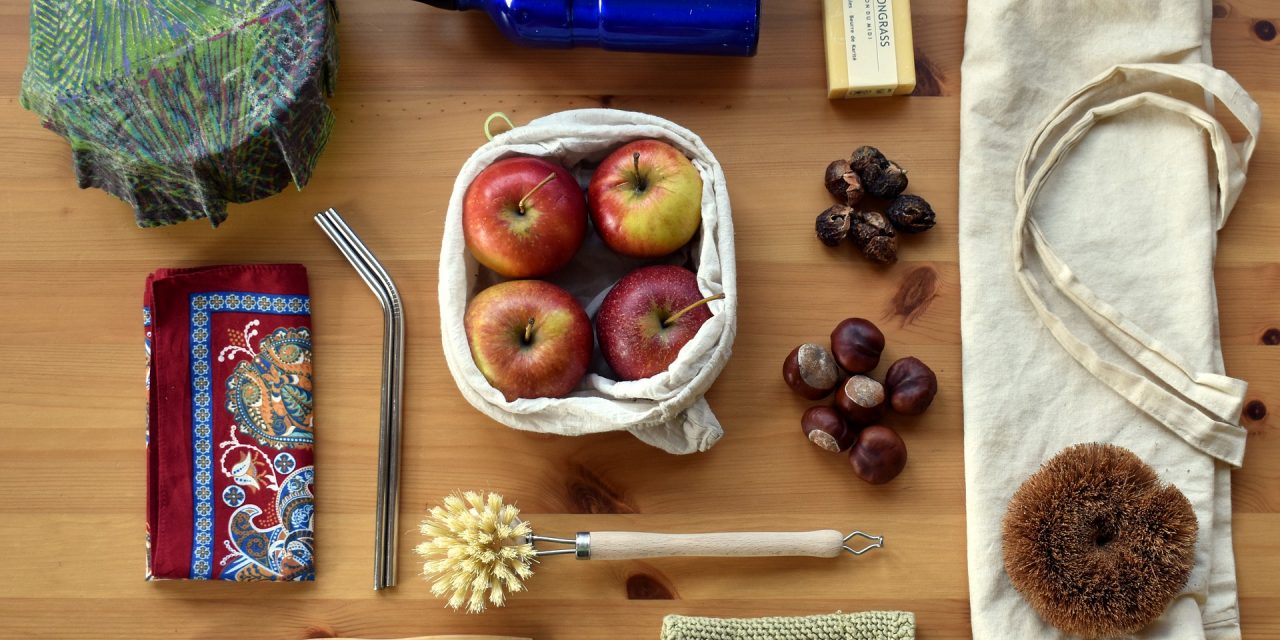
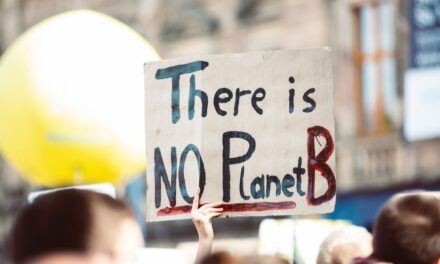

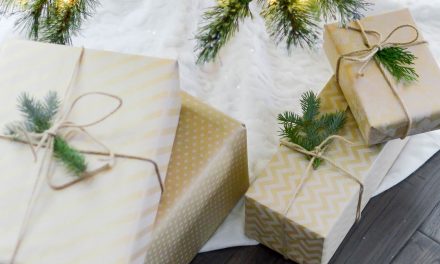
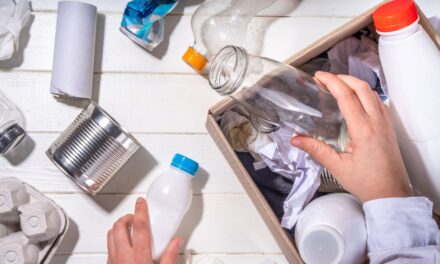
In the days when you used to pay a deposit on a bottle, people returned them for re-use. It was up to the company to package goods in re-usable containers. Now it seems people are being blamed for producing all this plastic waste, not companies. Should there not be some form of government legislation to enforce a ‘re-usable’ requirement for packaging?
We are on holiday here -Good to see the recycling waste bins on Eastborne Prom today but we’re shocked to find no recycling bins in the picnic areas at Battle Abbey despite huge numbers eating packed lunches and cans and bottle falling out of the bin provided
I am not sure if ESCC realise but there are over 10 Plastic Free Communities along the coast of East Sussex that are working really hard to get their communities to give up sup from schools, pubs, Council offices. There are a lot of us working hard and seeing results! IF you want to look at my campaign: Plastic Free Seaford or my Facebook Blog Zero Waste Maman. Personally, I only emptied my landfill bin once last year! It’s taken me years to get this far but it’s a wonderful feeling and totally realistic!
Hi Claire, that’s an amazing achievement! We’ll follow your page with interest 🙂
I like in East Sussex and since having my baby in Feb we have used almost exclusively cloth nappies. Although it is a lot of washing I am very pleased to put in the effort to save landfill the landfill.
Further we have a ‘nothing new’ policy for his toys, equipment, furniture etc. Choosing only second hand has saved us a fortune and hopefully the environment too. Especially where plastic toys are concerned.
And the conkers?
Hi Nic, good question! I hadn’t included them in my list (I didn’t notice them in the picture to be honest, so well spotted!) but apparently you can use them as laundry detergent. I found this article that explains how: https://wastelandrebel.com/en/make-laundry-detergent-out-of-chestnuts/ Thanks, Laura